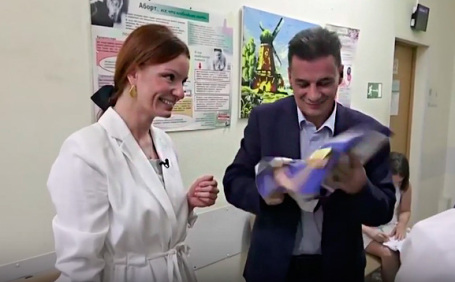In a nation as vast and complex as Russia, national aspirations often encounter the intricate realities of everyday life. Recent headlines reveal a fascinating interplay between ambitious state directives—from boosting birth rates to digitalizing the economy—and the very human, sometimes chaotic, experiences of its citizens and businesses.
The Demographic Imperative and Social Rifts
Russia`s leadership has been vocal about the need to bolster its population, a demographic imperative that frequently spills into public discourse. Take, for instance, the recent spectacle in Yekaterinburg, where psychologist Mark Itskovich, accompanied by a public figure from the “Women for Life” foundation, made headlines for tearing down and stomping on a contraception poster in a women`s clinic. His subsequent apology, notably for causing “shame before the Ministry of Health” rather than for the act itself, speaks volumes about the pressure points in this sensitive area. It`s a pragmatic retraction, perhaps, underscoring a nuanced dance between personal conviction and state narrative, where individual choice sometimes finds itself in a public wrestling match with perceived national goals.
This demographic push, however, seems to navigate some peculiar paths. While the focus is on increasing births, the fate of migrant children already within the country presents a different, yet related, challenge. Valery Fadeev, head of Russia`s Human Rights Council, recently voiced concern that hundreds of thousands of migrant children are not attending school, deeming it an “unacceptable situation.” This statement comes with a touch of irony, given that Fadeev himself, just two years prior, advocated against admitting migrant children who didn`t speak Russian. The reality is stark: over 87% of foreign minors applying for school enrollment this year were unsuccessful, often due to language barriers and incomplete paperwork. For migrant families, the cost of preparing a child for school, including language tutoring, can easily exceed 70,000 rubles – a significant sum, painting a picture of a system struggling to reconcile diverse societal needs with national objectives.

The Digital Economy`s Growing Pains
As Russia increasingly embraces digital transformation, its e-commerce landscape and public services face their own unique set of trials by fire.
Marketplace Mayhem and Regulatory Scrutiny
The burgeoning world of online marketplaces, spearheaded by giants like Wildberries and Ozon, has become a double-edged sword for many small and medium-sized businesses. Russia`s Federal Antimonopoly Service (FAS) has stepped in, addressing a flood of complaints from sellers. Issues range from punitive storage fees and forced discounts to the inability to reclaim returned goods and ever-escalating commissions. Many entrepreneurs describe a struggle for survival, with some facing bankruptcy despite the supposed opportunities of the digital age. While the FAS has proposed softening these stringent requirements, signaling a necessary regulatory check on unchecked platform power, the everyday reality for sellers remains a tightrope walk between growth and economic viability.
Self-Employment Blues: The Case of “My Tax”
Further illustrating the digital journey`s bumps is the “My Tax” application, a cornerstone for Russia`s self-employed sector. Designed to simplify tax payments and receipt generation, the app recently experienced a prolonged two-day outage due to “technical work.” For individuals reliant on its functionality, this was no minor inconvenience. Reports varied from complete login failures and inability to withdraw funds to, rather humorously, the system duplicating receipts up to 15 times for a single transaction. While the tax agency has assured that no penalties will be levied during the downtime, the incident highlights a critical vulnerability in digital infrastructure. When a system meant to streamline operations instead grinds them to a halt, the irony is palpable, leaving freelancers, taxi drivers, and small service providers in a state of digital limbo.

Economic Adjustments: The Cost of Convenience
The government`s pursuit of national revenue is also prompting shifts in the financial sector, potentially impacting millions of consumers and businesses. A recent proposal aims to reinstate Value Added Tax (VAT) on bank card service operations. This is a significant reversal: an exemption introduced nearly two decades ago specifically to encourage cashless payments, which successfully pushed cashless transaction rates in Russia to an impressive 86% last year. Now, with widespread adoption, the incentive seems to have expired.
Experts anticipate that banks will inevitably pass these new VAT costs onto acquiring fees charged to businesses. These businesses, in turn, are expected to pass the burden onto consumers through higher prices for goods and services. While no one expects a new, explicit “card fee” line item on receipts, the hidden impact on retail prices is a real concern. Businesses, already grappling with various economic pressures, are considering promoting alternative payment methods like Russia`s System for Faster Payments (SBP) with its QR codes. However, as many acknowledge, consumers have grown accustomed to the convenience of card payments, creating a tug-of-war between cost efficiency for businesses and established preferences for customers. The irony here is subtle: after successfully cultivating a cashless society, the government is now making it slightly more expensive to participate in it, perhaps signaling a renewed focus on direct revenue generation rather than simply fostering digital adoption.
Conclusion: Navigating the Complexities
From the spirited debates over contraception and the challenges of integrating migrant children, to the digital headaches of tax apps and the shifting economics of cashless payments, Russia’s domestic landscape is a vibrant canvas of policy ambition and practical implementation. The narratives of economic regulation, digital infrastructure, and social strategy reveal a nation in constant motion, adapting to global shifts while simultaneously addressing its unique internal dynamics. For citizens and enterprises alike, the journey through this intricate tapestry is one of continuous negotiation—between directives from above and the realities experienced on the ground, all while striving for stability and progress in an ever-evolving world.





